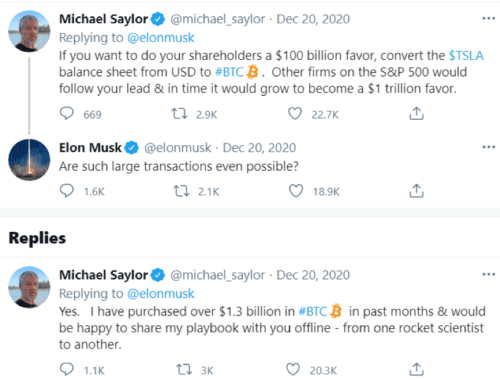Two weeks ago, we looked into the trigger for bitcoin’s next leg up. Since then, that trigger was pulled by none other than the richest man in the world. Elon Musk and his company Tesla bought bitcoin. And then the bitcoin price hit new all-time highs as a result. Does this mean the corporate shift into bitcoin is over, or just beginning?
Before we get to answering that question, a reminder of what we wrote to you just before bitcoin took off to new highs again…
Imagine you have hundreds of millions of dollars… of your employer’s funds to manage.
You’re the CFO, CIO, treasurer or whatever you want to put on your business card.
The problem you face is too much cash. Where do you put it?
It has to be somewhere you can quickly sell out of, in case the CEO needs the money.
Somewhere that is safe… safer than the bank.
Somewhere that earns a little interest, just to make you look good in board room meetings.
But where?
[…]
A corporate reserve asset?
You might think companies are mad to put their hard-earned cash and reserves into an asset that is spiking and plunging all over the place. As bitcoin is.
And you may well be right. But that doesn’t change the fact that it’s happening…
We profiled a few examples of companies allocating their cash to bitcoin. But their leading advocate has been MicroStrategy Inc. CEO Michael Saylor, who hopped on to CNBC to explain his actions. Here’s how I summed up his comments:
[…] as Saylor sees it, the company is being forced into bitcoin by the central banks’ money printing. “We don’t want to allow our treasury to be debased by 10 or 20 percent a year. We had to do something.”
This is an extraordinary hypothesis because it could apply to any and every institution and person with savings and wealth. Every investor.
If Saylor is right, the current economic policies are forcing such people out of cash to avoid losing the value of their wealth. He calls this “decapitalisation”. But what do they turn to instead?
Many turn to gold. Or stockmarkets. Or property.
But, bitcoin, as a financial system, fits the bill uniquely well. It’s cash without the risk of decapitalisation. At least, not by money printing…
He makes this explicit: “It actually looks like [bitcoin] is emerging as the primary treasury reserve asset for people that are looking for some way to avoid the great monetary inflation.”
The big news early last week was that Elon Musk had allocated $1.5 billion of his company’s spare cash into bitcoin in December.
Not that this should be much of a surprise. Saylor and Musk had discussed it openly on Twitter…
Predictably, the bitcoin price surged to new highs on the back of the news confirming Tesla’s position. Musk has that effect on things…
The critics piled in on the move.
The Financial Times got a list of corporate finance experts together to criticise the move: “Tesla’s bitcoin bet is unlikely to have many corporate copycats”. The experts explained how misguided Musk was to allocate his company’s money to bitcoin.
And, in another article, the FT added that “Elon Musk’s effect on crypto world shows how irrational markets are”.
Bloomberg explained just how messy the new allocation would be: “Elon Musk’s Bitcoin Bet Is a Bean Counter’s Nightmare – Tesla is taking a massive financial risk”.
And the LA Times was a bit more honest: “Elon Musk’s Bitcoin embrace is a bit of a head-scratcher”.
One of the FT’s experts outlined the key issue in much the same way we did in Fortune & Freedom two weeks ago:
“Corporations invest their cash in very high quality, short-term fixed income securities, and are willing to accept a relatively low rate of return,” said Jerry Klein, a managing director at Treasury Partners, an investment management firm in New York. “I don’t think there is a case to be made for investing corporate cash in a risky asset like bitcoin, where they could experience significant declines.”
What these experts are missing is the elephant in the room. The harsh criticisms of bitcoin which they make only highlight why companies are allocation money to bitcoin instead of the alternatives. For companies to move their funds to bitcoin, the alternatives must be even worse!
And they are. Two weeks ago, we explained this. Having asked what companies tend to allocate their funds to, so they’re not just sitting in cash in the bank, here’s what I wrote back then:
The answer used to be the government bond market, or similar assets. These are loans to the government. Why keep the company money there? Because bonds are investments that can be instantly sold without having to worry much about a huge transaction making the price swing. They also offered some interest. And the comfort of convention. Nobody would criticise you for doing it.
Trouble is, bonds don’t pay much interest anymore. Neither do the similar alternatives. And money is being printed like mad by governments’ central bankers. Which means the government bonds – promises to pay money in the future – are looking rather risky.
More and more companies are wondering if there’s an alternative. And some have found one in the cryptocurrency market.
And that’s before negative rates appear in the UK…
If companies are doubting the ability of the financial system to serve them properly, necessitating allocations to bitcoin (as they see it), that signals things are rather troubling in the alternative markets.
And perhaps that is the real story here. Sure, the bitcoin price fluctuates wildly. But if it goes up over time, that’s preferable to having your company’s money in cash or negative-yielding bonds.
Eric Peters, the founder and chief investment officer of One River Asset Management argues the phenomenon is spreading beyond sophisticated company executives too. He noticed that one of the motivations for the recent Reddit and wallStreetBets crowd’s attacks on Wall Street hedge funds was the corruption of the financial system – how it works against them:
“I was looking through reddit chatrooms, wallstreetbets, you know,” said the PM. “Kind of felt surprised by the chatter. I didn’t realize how many people out there understand the extent of the Fed market manipulation that occurred over the past year. Ever since 2008 really,” he continued.
“Not sure why it grabbed me. I suppose I’ve just been under this illusion that it’s mostly people in our industry who see through what has been happening, and that the rest of the people working in random industries, with real jobs, haven’t understood it.” I nodded, faith in our institutions gradually slipping away. “The level of disillusion with the system is kind of breathtaking – I just didn’t appreciate how widespread it seems to be.”
The world is waking up to the problems in the financial system. How it is being used against them. They are looking for ways out. And that’s what bitcoin was created to do.
It’s also what Fortune & Freedom was founded to do. Although we see the financial system as full of opportunities to invest.
Strangely enough, the book I’m reading is about the American population waking up to the corruption of the financial system too. But that’s another story…
The speculative mania in bitcoin may actually be a clamour to get out of a smoky theatre. If that’s true, the great escape may only just be beginning.

Nick Hubble
Editor, Fortune & Freedom
The post Are companies buying bitcoin as an investment or as future money? appeared first on Fortune and Freedom.
The Article Are Companies Buying Bitcoin As An Investment or as Future Money? First Appeared ON
: https://gqcentral.co.uk


Comments are closed